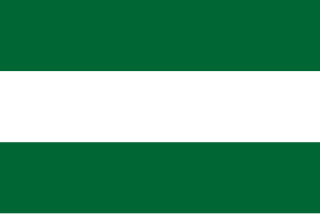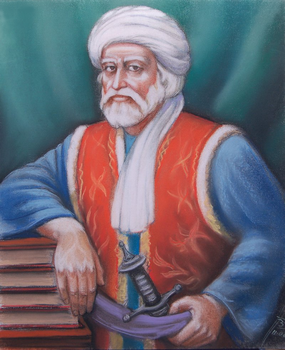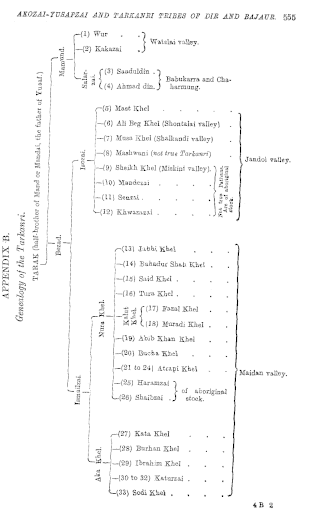
The Durrani Empire, or the Afghan Empire, also known as the Sadozai Kingdom, was an Afghan empire founded by the Durrani tribe of Pashtuns under Ahmad Shah Durrani in 1747, which spanned parts of Central Asia, the Iranian plateau, and the Indian subcontinent. At its peak, it ruled over present-day Afghanistan, much of Pakistan, parts of northeastern and southeastern Iran, eastern Turkmenistan, and northwestern India. Next to the Ottoman Empire, the Durrani Empire is considered to be among the most significant Islamic empires of the second half of the 18th century.

The Yusufzai or Yousafzai, also referred to as the Esapzai, or Yusufzai Afghans historically, are one of the largest tribes of Pashtuns. They are natively based in the northern part of Khyber Pakhtunkhwa, to which they migrated from Kabul during the 16th century, but they are also present in parts of Afghanistan, including Kunar, Kabul, Kandahar and Farah. Outside of these countries, they can be found in Ghoriwala District Bannu, Balochistan Sibi (Akazai), Chagai (Hassanzai) and Rohilkandh.

Khošāl Khān Khaṭak (Pashto: خوشال خان خټک; Urdu, Persian: خوشحال خان خٹک; 1613 – 20 February 1689), also known as Khushal Baba, was a 17th-century Pashtun poet, chief, and warrior. Khushal Khan served the Mughal Empire protecting them from Pashtun warriors over most of his lifespan. After being expelled from his tribal chiefdom and replaced with his son by his Mughal superiors, Khushal Khan turned against the Mughals. Afterwards, Khushal preached the union of all Pashtuns, and encouraged revolt against the Mughal Empire, promoting Pashtun nationalism in the last years of his life through poetry. Khushal wrote many works in Pashto but also a few in Persian. Khushal is considered the "father of Pashto literature" and the national poet of Afghanistan.
The Marwat is a Pashtun tribe, a branch of the Lohani tribe and belong to Lodi section. The Marwats were named for their ancestor Marwat Khan Lodi.

Mohammadzai, also spelled Moḥammadzay, is a Pashtun sub-tribe or clan of the Barakzai which is part of the Durrani confederacy of tribes. They are primarily centered on Kandahar, Kabul and Ghazni in Afghanistan as well as in the city of Charsadda in neighbouring Pakistan. The Mohammadzai ruled Afghanistan from 1823 to 1978, for a total of 155 years. Their rule ended under Daoud Khan when the Communists took power via a Soviet-backed coup.
The Kundi is a sub-tribe of the Niazi tribe of Pashtuns, that inhabit most areas of Tank and D.I.Khan.

The Turi or Torai are a tribe of the Pashtun people, inhabiting the Kurram Valley, in Kurram Agency in the Federally Administered Tribal Areas of Pakistan, with a smaller number living across the Durand line in the Paktia province of Afghanistan. They speak Pashto and are adherents of the Twelver Shia sect of Islam. Unlike the majority of Pashtun tribes, The Turis predominantly follow the Shia sect of Islam, because of this and other reasons and land history they are usually tensions between them and the Sunni Pashtun tribes; Mangal and Bangash tribe who also live in Kurram Valley.
The Shirani, also spelled Sherani, are a Pashtun tribe, from the Sarbani tribal confederacy, who live in Afghanistan and Pakistan. The Sherani are mostly settled in the Frontier Region Dera Ismail Khan, in the Federally Administered Tribal Areas of Pakistan and in the adjoining Sherani District of Balochistan, Pakistan. Some clans have settled in other surrounding districts of Balochistan; and in the Zabul, Ghazni, and Kandahar provinces of Afghanistan.

The Mahsud or Maseed is a Karlani Pashtun tribe inhabiting mostly the South Waziristan Agency in Khyber Pakhtunkhwa province of Pakistan.

The Durrani dynasty was founded in 1747 by Ahmad Shah Durrani at Kandahar, Afghanistan. He united the different Pashtun tribes and created the Durrani Empire. which at its peak included the modern-day Afghanistan, Pakistan, as well as some parts of northeastern Iran, eastern Turkmenistan, and northwestern India including the Kashmir Valley.
The Pashtuns of Punjab, also called Punjabi Pathans or Pathans, are descendants of Pashtun settlers, an Eastern Iranian ethnic group, in the Punjab region of Pakistan and India. They were originally from the Pashtunistan region of Afghanistan and Pakistan bordering the Punjab region. Most of these Pashtun communities are scattered throughout the Punjab and have over time assimilated and integrated into the Punjabi society and culture.

The Bettani, also spelled Batani, Baittani or Bhittani, is a Pashtun confederacy located mostly in Afghanistan and Pakistan. The Bettani are named after Shaykh Beṭ, their legendary ancestor, who is said to be the third and last son of Qais Abdur Rashid.

The Pashtun tribes, are tribes of the Pashtun people, a large Eastern Iranian ethnic group who speak the Pashto language and follow Pashtunwali, the social code of conduct for Pashtuns. They are found primarily in Afghanistan and Pakistan and form the world's largest tribal society, comprising over 60 million people and between 350 and 400 tribes and clans. They are traditionally divided into four tribal confederacies: the Sarbani (سړبني), the Bettani (بېټني), the Ghurghusht (غرغښت), the Karlani (کرلاڼي) and a few allied tribes of those that are Ismailkhel, Khel, Ludin, Sakzai, and Zai.

The Mangal are a tribe of the Afghan or Pashtun people residing in eastern Paktia and adjacent Khost provinces of Afghanistan, and in the town of Tari Mangal, district Kurram, Pirdil Khel, Fatima Khel and Surrani of Bannu Pakistan. Their land constitutes the northeastern part of the Loya Paktia region. The Mangals descend from Karlani Pashtun lineage.

The Khugyani, Khogyani or Khogiani tribe is one of the Karlāṇī tribes of the Pashtun people. The tribe originated in the Khogyani district in Nangarhar province of Afghanistan. The Khogyani District is in eastern Nangarhar province of Afghanistan, near the city of Jalalabad and the Kōh-i-Safēd.
Khel are sub-tribes of Pashtun tribes in Afghanistan and Pakistan. The title of the tribe ends in Zai and its sub-tribe name ends in Khel. Khel is also a common final element in the names of villages in Afghanistan and in the Khyber Pakhtunkhwa of Pakistan, such as Darra Adam Khel.

The Kakazai, also known as Loi, Loe, or Loye Mamund, a division of the Mamund clan, are a Pashtun tribe part of the larger Tarkani tribe who are primarily settled in Bajaur Agency, Pakistan, but originally hailed from the Laghman province of Afghanistan. However, it has grown and scattered around to such an extent that it is recognized as tribe of its own.

The Banuchi/Bannuzai, Shitak, or Banusi, Banisi is a Pashtun tribe which has the reputation of being one of the most warlike amongst the Pashtun people.They are settled in Bannu, Dera Ismail Khan, North Waziristan and Kurram of Pakhtunkhuwa, some members of which are settled in Paktia, Paktika,Khost and Injil of Herat, Afghanistan. Shitak was the name of his ancestors. Hence, according to Pashtun traditions, his descendants are known as Shitaks.However they are famous by their nickname like Banuchi or Banusi and these people call themselves Banisi, because the name of the Bannu area comes from Bin, a sinskrit word which is used for a forest,there were plenty of mulberry trees and Shisham trees. Later on, it evolved into Bana and then to Bani. Even local people and the surrounding people used the same names that are Bana or Bani for Bannu currently.. The Banuchis descend from the Shitak superclan of the larger Karlani tribe.
The Akakhel, pronounced Akaa Khel or Akakhail, are a Pashtun sub-tribe of the Ghilji/Ghilzais confederation. Their mother language is Pashto. In the early 20th century, the tribe was generally pastoral. The Akakhel are one of the largest Ghilji Pashtun subtribes. A reasonable majority of those who were living on the Durand Line migrated since 1800s into Khyber Pakhtunkhwa, Balochistan and Punjab provinces of Pakistan to Sikander Abad Charsadda,Peshawar,Swat(Barikot), Buner(Topdara), Abbottabad, Nowshera, Mardan, Attock, Rawalpindi, Islamabad, Gujranwala, Gojra, Faisalabad, Lahore, Multan, Hyderabad, Karachi and Quetta. The exact population number of this clan is not known; however, it is estimated to be around 2 million all around the world The population of this tribe primarily lives in Pakistan and Afghanistan. 85% live in Pakistan and about 1% or 2% live in Afghanistan and remaining 13% lives in England, Germany, United Arab Emirates, China, Malaysia, Canada and United States of America.












